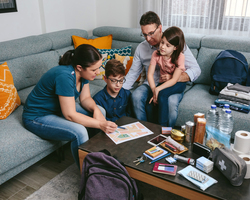
No one likes to think about something terrible happening in his or her community. But every year, natural and human-caused disasters affect hundreds of families.
Do you need a plan?
It's important for families to have an emergency plan in place before disaster strikes.
Knowing what to do in case of an emergency can help reduce your fear and anxiety—and even keep you out of harm's way altogether.
Being prepared may also protect you against possible losses or ease the impact of the disaster, according to the Federal Emergency Management Agency (FEMA).
Learn about hazards in your area
Knowing what your risks are is the first step in creating an emergency plan. Find out what natural disasters, such as floods, tornadoes, wildfires or earthquakes, are possible in your area. In addition, learn about potential human-caused disasters—such as hazardous-materials incidents or nuclear power emergencies.
The American Red Cross or your local emergency-management office can educate you about what types of disasters are most likely to occur in your area.
You can also find national hazard maps at fema.gov.
Create a family emergency plan
Once you are aware of potential dangers, you can create an effective emergency plan.
FEMA suggests that your emergency plan address issues such as:
Family communication. All members of your family should memorize the phone number of an out-of-town contact person. Always carry a cellphone to call this person to check in if there is an emergency.
Evacuation plans. Local officials will usually provide information about how and where to evacuate in the case of a natural or human-caused disaster. Also, know about local warning services, such as sirens or emergency radio or TV broadcasts.
Establish where your family will meet in case of an emergency. Consider having different meeting places, both within your neighborhood and outside of it, depending upon the kind of emergency.
Hurricanes, for instance, allow people time to prepare for evacuations. Other hazards, however, do not allow for such preparations. That is why it is important to have an advance emergency plan in place.
Utility safety. You may need to know how to shut off your utilities in the case of an emergency. Natural gas, for instance, can cause explosions and fires, so all family members should know how to shut off gas service.
Some disasters may crack water lines and pollute the water supply, so it's also important that family members know how to shut off the water.
Personal records. Create an inventory of your personal property, and keep your important documents, such as insurance records, property records and identification, somewhere safe, such as a safe-deposit box.
Care for pets and livestock. Consider the needs of your pets and livestock when making a disaster plan. Identify shelter and other resources for your animals.
Do not leave pets at home in the event of an emergency. Pets usually cannot survive on their own, warns FEMA, and should not be left behind if there is an evacuation. Identify appropriate shelter, such as a hotel or motel that allows you to bring your pets, because many emergency shelters will not accept pets. Contact your local emergency management office or animal shelter for advice.
If possible, pack a pet emergency kit as well. Include food, water, medications, veterinary records, cat litter and litter box, and a can opener in case you need them later.
Safety skills and supplies. For your safety, family members should know how to administer first aid and CPR. You should stock basic first aid supplies, clothing, bedding and tools in your home.
In addition, prepare a disaster supply kit in case you need to survive on your own after a disaster. This kit should include enough food, water and basic supplies for three days. Also include copies of important personal records.
Designate a specific place in your home for the kit, and make sure everyone in your family knows where it is. For a car kit, you may also want to include flares, jumper cables and gear for different types of weather.
For more information on specific types of storms and disasters, visit the Disaster Preparedness health topic center.
Reviewed 7/16/2024